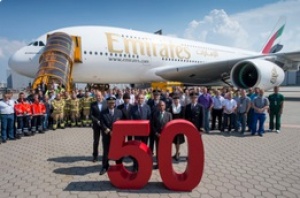Emirates receives its 50th A380 aircraft

Emirates has received its 50th A380 aircraft, strengthening its position as the world’s largest international airline.
This latest delivery takes Emirates’ all wide-body fleet to 224 aircraft, representing the world’s largest fleet of A380s, and also the world’s largest fleet of Boeing 777s.
After the entry of its 50th A380 aircraft into service by early August, Emirates will offer on a weekly basis a total of 5.7 billion available seat kilometres (ASKMs) to 145 destinations which span the globe from Los Angeles to Auckland. Since April 2010, Emirates has received 96 aircraft (all A380s and Boeing 777s), increasing its overall capacity by 64% in ATKMs and 71% in ASKMs, while consistently maintaining seat load factors of close to 80%. During this period, Emirates also added 48 cities to its global destination network.
Sir Tim Clark, President of Emirates Airline said: “Emirates has seen tremendous organic growth in the past 4 years, probably the fastest of any airline in history. We’ve literally added capacity equivalent to what some mid-sized airlines operate, but more significantly, we have maintained high seat loads and profitability. This speaks to the strength of our world-class product, and also our business model which is based on an efficient global hub that connects Dubai to the world, and almost any two cities in the world via Dubai.”
He added: “The A380 has been very successful for us, and this is reflected in the strong customer interest and high seat factors wherever we’ve deployed the aircraft. The A380 has helped us serve customer demand on trunk routes, operate more efficiently at slot-constrained airports, and also introduce new concepts on-board that have redefined the flying experience. Moving forward, we will see quite a ramp up in the delivery programme and by late 2017 we will have around 90 A380s in our fleet to support existing and new A380 routes.”
ADVERTISEMENT
John Leahy, Airbus Chief Operating Officer, Customers said: “The A380 is pleasing its operators by increasing passenger traffic, strengthening load factors and improving their market share. The delivery of the 50th A380 to Emirates shows the profit enhancing capabilities of this aircraft and the extraordinary vision of Emirates and Sir Tim.”
Largest A380 operator
Emirates has the biggest A380 route network of any commercial airline, currently serving 27 airports on 5 continents. Its Dubai-Los Angeles route is the world’s longest A380 flight in operation. By the end of this year, the number of destinations served by an Emirates A380 will increase to 33, with the addition of Kuwait on 16th July, Mumbai on 21st July, Frankfurt from 1st September, Dallas from 1st October, San Francisco from 1st December and Houston from 3rd December.
To date, the airline’s fleet of A380 aircraft has carried 27.5 million revenue passengers, made over 68,800 trips and covered more than 405 million kilometers. The Emirates A380 has also visited over 40 airports around the world for tests and tours.
Emirates currently has over 10,000 cabin crew and 900 flight deck crew specially trained to operate its growing A380 fleet.
Order book creates and supports jobs across supply chain
Emirates has 299 wide-body aircraft on its order book, including 90 more A380s, creating and sustaining thousands of jobs across the aircraft manufacturing supply chain. Many of these new jets have been earmarked to replace the older aircraft in Emirates’ current fleet.
Modern, efficient aircraft have always been central to Emirates’ business model. It means better operational economics, and also the ability to offer the latest on-board features for the best possible flying experience. The average age of Emirates’ fleet is 74 months, compared to the industry average of 140 months.
On the ferry flight for Emirates’ 50th A380, the Airbus Foundation and Action For Hunger sent 41 tonnes of cargo consisting of Plumpy Nut food bars to support several existing nutrition programmes in the region, mainly in Yemen. The peanut based food bars will be used to feed children five and under, suffering from acute malnutrition. The cargo will be storied in the United Nation Humanitarian Response facility in Dubai. This will be the single largest humanitarian cargo shipment in the history of Airbus.

